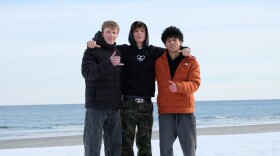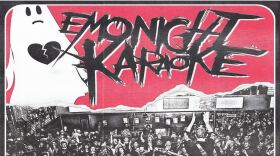For 36 years the Newington company Sea-3 has imported propane from Algeria and other countries. Ships come into port, off-load the fuel, and Sea-3 stores it and sells it locally.
Then two years ago, hydraulic fracturing, or fracking, in places like North Dakota led to a boom in production, and American propane actually became cheaper than foreign propane. And with that, says Sea-3s’ vice-president Paul Bogan, the company’s business model was no longer profitable.
“Essentially,” he says, “we’ve been out of business for the last couple of years.”
Bogan says the only way Sea-3 can stay in the black is by reversing its business model and selling domestic propane to customers here and abroad.
But in order to do that, the company needs a permit from the Newington Planning Board. And for residents who live near the Pan Am rail line, the specter of trainloads full of highly flammable liquid on the move just a short distance their homes is downright frightening.
Rich and Catherine DiPentima live on Dunlin Way, in Portsmouth, along the Pan Am tracks, which the couple says are in terrible shape.
“Even to the naked eye, you can see it looks really old and decrepit,” Catherine DiPentima says.
Smaller quantities of propane, jet fuel and other materials already pass by DiPentima’s home about once a week. And once a year, the Portsmouth Naval Shipyard transfers a trainload of nuclear waste on these tracks. But the couple says the sheer quantity of propane proposed makes this a different story.
Rich DiPentima, who can recite the details from a 1983 propane car explosion in Murdock, Illinois, says he can imagine a similar disaster occurring right outside his door. “If we have trains going as fast as 25 miles an hour,” he says, “and they have an accident with a derailment, where a tank car falls of the tracks, it could puncture, start a fire, and evacuate up to a mile around it.”
DiPentima’s description evokes images from last year’s derailment at Lac-Megantic, in Quebec, where a train went off the tracks and exploded, killing 47 people.
Amy Myers Jaffe is executive director of Energy and Sustainability at UC Davis’s Graduate School of Management. She says pipelines are the safest way to transport the country’s growing supply of oil and gas, but building them takes time and political will.
“The regulatory system and the condition of infrastructure in the United States has lagged behind the unexpected boom in supply,” she says. For now, rail is the only option.
But, Jaffe says, many factors that have led to high-profile train wrecks like the one in Lac-Megantic don’t come into play with propane. Those trains, Jaffe says, were carrying crude oil. And while the boom in crude oil has led to regulation problems with misclassified materials and containers, propane transport is well-regulated, and generally considered safe.
“People need to step back from worst case scenarios and think about what’s routine and what’s not routine,” Jaffe advises.
Newington town planner Tom Morgan says he can see both sides.
For example, he says, Sea-3’s plan could bring down the cost of propane. He acknowledges that the PanAm tracks are not in the best shape, but, he says, the rail company has offered to upgrade the tracks and restrict speeds to 10 miles an hour.
And after working with Sea-3 for 22 years, he trusts the company will hold PanAm to those promises.
“When they say they’re going to do something, historically they have,” says Morgan.
Still, residents are nervous. They want Sea-3 to pay for a comprehensive safety report produced by an independent party before moving forward with their plan.
Lou Salome, a neighbor of the DiPentimas, says he’s not just concerned for his own property in Portsmouth.
Not only would the nighttime noise be bad for business, he says, but “the track runs along hotels, the Sheraton, the Hilton is nearby, the Marriot is nearby. All it takes is a ‘kaboom’ and there goes your tourism destination.”
Those concerns will likely come up at Monday’s public hearing. The Newington Planning Board hopes to make a decision in the next several weeks.










